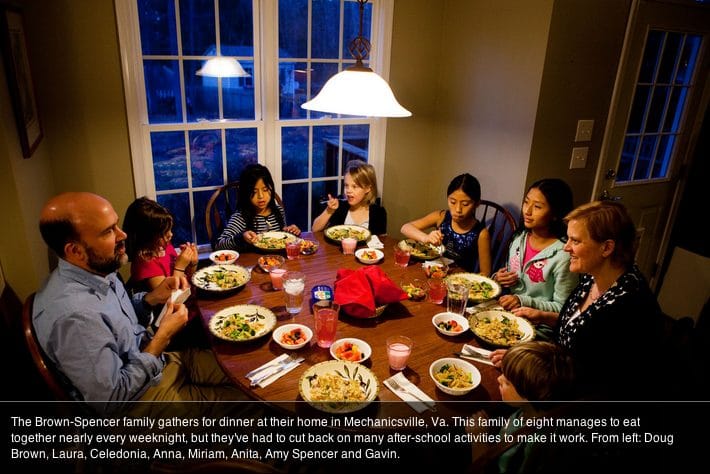
Bee Cave Chiropractor asks “How Important is the Family Dinner ?”
According to a recent story on NPR’s “All Things Considered”, the family dinner might be a fading tradition.
The station asked on its Facebook what families were struggling with during the week, and found many parents reporting the task of nailing down a family dinner a difficult one.
One mom’s post on the status chronicled her efforts of feeding her family at night.
“Our dinner is like the counter at a diner—no one eats the same thing or at the same time,” the commenter said.
She compared her cooking style to that of a short-order cook, which she attributed to her family’s differing tastes and eating times.
“[With a] meat-eating husband [that] gets home very late from work, vegetarian-ish daughter, picky child with autism, and health conscious mom… I’ve started buying healthy takeout dinners from a local caterer rather than cooking and cleaning pots and pans from two to three separate meals a night. Ugly!”
NPR, with the Robert Wood Johnson Foundation and the Harvard School of Public Health, conducted a poll on children, weight, and how that correlates to the “crunch time” during the American workweek and school week.
The poll found that “about a quarter of children surveyed live in homes where — on a given night— the TV is on, or someone is using an electronic device. The poll also found that, despite families ranking a family meal as a high priority, about half of children live in a home where, on a given night, families don’t sit down together to eat or share the same food,” according to NPR.
In the store, there is a contrast of two families—one being a family of eight that does a sit-down family meal every night, and another family’s that lasts only eight minutes, and is full of technological distractions. Both families find bonding as a high priority, but differ in their structure. You read more in the NPR story here.
Addressing a study that found children who had a family meal as a part of their routine in middle-school were often healthier eaters in high school and benefited emotionally, Kelly Musick, an associate professor at Cornell University, said “We think family dinners matter because they provide an opportunity for families to sit down together, to relax, to communicate, to share happenings about their day.”
What are your thoughts on family dinners? Do you think that it is about sitting around the table, breaking bread (so to speak), or does it matter where you are bonding and teaching a healthy lifestyle as long as you are doing it?



